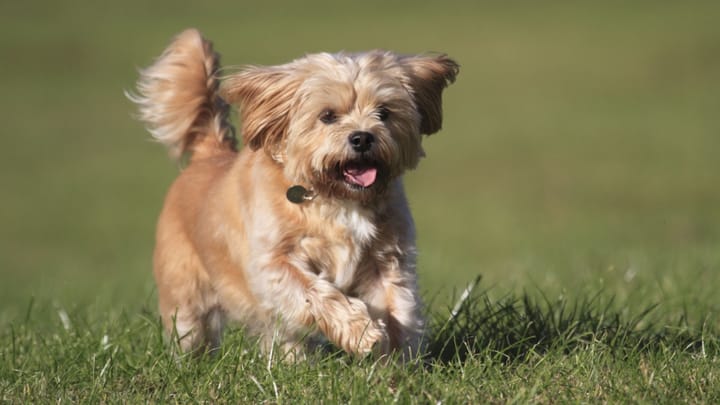Shorkie
Crossbreed: Yorkshire Terrier × Shih Tzu


The Shorkie, a cross between the Yorkshire Terrier and the Shih Tzu, is a small dog with unique charm. Loving, affectionate and adorable in equal measure, Shorkies have quickly become popular companions for families and people of all ages. Here's all you need to know about this very special crossbreed.
Yorkshire Terriers are lively, intelligent dogs that deserve respect as true terriers, not toys. Best suited to families with gentle, respectful children, they make excellent companions. Originally bred as rat hunters, they remain alert and vocal, making them effective watchdogs. Though now often seen in shows or as pets, they’re the smallest but boldest of the terrier group.
The Shih Tzu is a small Tibetan dog, traditionally kept exclusively as a companion. Not ideally suited to very active lifestyles, this breed is nonetheless a delight to live with. Despite occasional stubbornness, the Shih Tzu is sociable and friendly with everyone. Lively, intelligent, playful, and relatively docile when well trained, this little dog brings lots of joy to its family.

Yorkshire Terrier
Yorkshire Terriers are lively, intelligent dogs that deserve respect as true terriers, not toys. Best suited to families with gentle, respectful children, they make excellent companions. Originally bred as rat hunters, they remain alert and vocal, making them effective watchdogs. Though now often seen in shows or as pets, they’re the smallest but boldest of the terrier group.

Shih Tzu
The Shih Tzu is a small Tibetan dog, traditionally kept exclusively as a companion. Not ideally suited to very active lifestyles, this breed is nonetheless a delight to live with. Despite occasional stubbornness, the Shih Tzu is sociable and friendly with everyone. Lively, intelligent, playful, and relatively docile when well trained, this little dog brings lots of joy to its family.
|
Life expectancy |
The Shorkie has a life expectancy of between 15 and 17 years |
|
Temperament |
|
|
Size |
Small
|
|
Adult size |
Female
Between 6 and 12 in
Male
Between 8 and 14 in
|
|
Adult weight |
Female
Between 7 and 11 lb
Male
Between 9 and 13 lb
|
|
Coat colour
|
Black White Brown Sand |
|
Type of coat
|
Long |
|
Eye colour
|
Brown
|
|
Purchase price |
The Shorkie costs between £500 and £1200 |
Shorkies can take after either parent breed to varying degrees. Some may resemble the Yorkshire Terrier more closely, while others show more traits of the Shih Tzu. In cases where Shih Tzu characteristics are more prominent, the muzzle may be slightly brachycephalic, shorter than average, but it’s typically less compressed than that of a purebred Shih Tzu.
More details about the Shorkie
Shorkie: Origins and history
The Shorkie is a cross between the Shih Tzu and the Yorkshire Terrier, created in the United States in the 2000s . This crossbreed has resulted in an affectionate and adaptable family companion, inheriting the aesthetic qualities and small size of its parents. Shorkies have gained popularity in recent years, thanks to their balanced temperament and beautiful coat.
Shorkie: Characteristics
Shorkie: Behaviour
Training a Shorkie
Shorkies respond best to short, frequent training sessions using positive reinforcment methods.
Consistency is key, as Shorkies can be stubborn. Training sessions should be short, about 10 to 15 minutes, to maintain their interest. By using treats and praise, you can encourage good behaviour and build a trusting relationship with your Shorkie .
Shorkie: Lifestyle
Breed compatibility Shorkie
Shorkie: Purchase price
Shorkies can cost between £500 to £1,200, depending on the breeder and location. In addition to the initial cost, you will also need to factor in expenses for food, insurance, vet check-ups and accessories.
Shorkie: Shedding
Average
With a medium-long coat, Shorkies require regular grooming. Daily brushing will help avoid painful mats and tangles.
Shorkie: Health
Shorkies are relatively sturdy, but like with any small breed, special care must be taken to prevent injury when playing with children or other dogs.
Shorkies may have difficulty tolerating high temperatures, particularly if they inherit the Shih Tzu's brachycephalic muzzle.
The Shorkie's silky coat provides some protection from the cold, but this is not a crossbreed that enjoys extremely low temperatures.
Shorkies can be prone to obesity, so careful monitoring of their diet is recommended.
Shorkies can suffer from hereditary health problems, such as cataracts, tracheal collapse (a deformity of the windpipe), and ear infections. Respiratory problems related to brachycephaly are also common, especially if the Shorkie inherits the Shih Tzu's short muzzle. Dental disease can occur, so oral hygiene is important.





